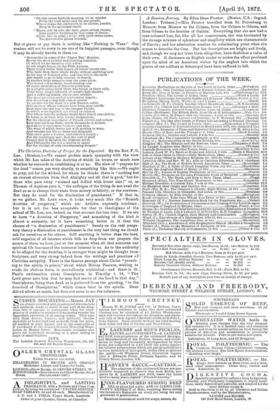The Christian Doctrine of Prayer for the Departed. By the
Rev. F. G. Lee. (Strahan.)—We cannot profess mach sympathy with the view which Mr. Lee takes of the doctrine of which he treats, or much care whether he succeeds in establishing it or no. His view of "prayers for the dead " comes, put very shortly, to something like this :—We ought to pray, not for the wicked, for whom ha thinks there is ‘' nothing but an eternal alienation from God Almighty and all that is good," but for those who pass away "stained and defiled with lesser sins ;" or, as Thomas of Aquinas puts it, " the suffrages of the living do not avail the dead so as to change their state from misery to felicity, or the converse. But they do avail for the diminution of punishment." If that is, as we gather, Mr. Lee's view, it looks very much like the "Romish doctrine of purgatory," which our Articles expressly condemn ; but it is not the less acceptable for that to theologians of the school of Mr. Lee, nor, indeed, on that account the less true. If we are to have "a doctrine of nugatory," and something of the kind is almost a necessity, let it have something better in it than the chance of "a diminution of punishment:" Surely on the real purga- tory theory a diminution of punishment is the very last thing we should ask for ourselves or for others. Still anything is better than the bare, cold negation of all interest which bids us drop from our prayers the names of those we love, jest at the moment when all that concerns our spiritual life becomes of the intensest interest to us. As to the authority to be alleged for the doctrine, it is stronger than might be thought from Scripture, and very strong indeed from the writings and practices o f Christian antiquity. There is the famous passage about Christ "preach- ing to the spirits in prison," about which Bishop Pearson, wishing to evade its obvious force, is marvellously sophistical ; and there is St. Paul's exclamation about Onesiphorus in Timothy i. 18, " The Lord grant unto him that he may find mercy of the Lord in that day," Onesiphorus, being then dead, as is gathered from the greeting, " to the household of Onesiphorus," which comes later in the epistle. Dean Alford allows so much, but does not seem to see the inference.


































 Previous page
Previous page